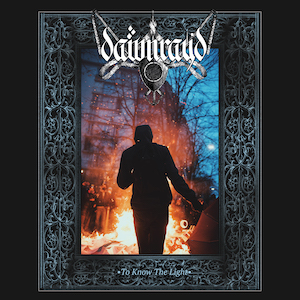Whether some want to admit it or not, political themes and music will always be intertwined. None more so than in the punk and metal genres, from calls to action on the less fortunate to pure anarchy and everywhere in between (including some unfortunately awful ideologies that we won’t speak further of). Dawn Ray’d have never been shy of displaying their viewpoints on their sleeve, with themes ranging from anarchism, anti-facism and anti-capitalism at the root of their belief system. In turn, they’ve delivered their message powerfully to this point with their folky black metal approach.
An interesting anecdote about their latest album To Know the Light is that deep into the writing process, the band was unsatisfied with what they had written and decided to begin anew. A difficult decision, to be sure, and one wonders what they had brewing before halting and starting over. Maybe we’ll hear it someday, maybe not. What the band produced instead is certainly intriguing as it is peculiar.
Album opener “The Battle of Sudden Flame” immediately calls for action against authority and police states, all in a direct tremolo-picked fury accompanied by downtrodden violins and harmonized chants/screams. Twists and turns abound, as this selection is equal parts somber and vigorous, setting the unconventional tone of what’s to come. Acoustic guitars briefly set up “Ancient Light,” transitioning to a harmonium piece layered with a guitar-heavy blackened ambiance. Harmonized chants and screams are a large part of this song, too, which sometimes is laid on a little thick. The synth heavy start to “Inferno” moves into an early 90s Norwegian black metal sound with a rawness that works reasonably well, before a violin interlude effusively changes the tempo.
“Requital” is a fully harmonic chanted respite, of which portrays a poignant message, but is a jarringly awkward moment that begins a downturn. Trying to pick the pace back up is “Sepulchre (Don’t Vote)” in what is a neatly packaged burst of angst that tries to bring proceedings back on the rails. Another interlude follows; this one being a pleasing violin piece accompanied by acoustic guitars and spoken word calls for liberation. It’s well executed, but again unnecessarily pumps the brakes. One wonders if placed elsewhere on the album, this would have been more effective, but alas. “In the Shadow of the Past” is a well-written jaunt, balancing their black metal stylings with subdued undertones. An oddly offbeat folk rock entry in “Freedom in Retrograde” follows, while “Wild Fire” adds percussive marches and more stylized chants to the mix. Closer “Go Free as Companions” begins with heavy violins before organs take over mid-song, transforming to a nearly doom pace accompanied by, you guessed it: more chants.
To Know the Light is an enigma; a mystery wrapped in a riddle, to paraphrase Winston Churchill (or in my stupid case, Elaine on Seinfeld when trying to unravel the puzzle that is Newman). A classic yet refined style of black metal remains at their core, along with well performed violins among other folk instrumentation, to go along with a powerful message. Predecessor Behold Sedition Plainsong was far more consistent while still being distinctly creative and impactful, while To Know the Light places obstacles in its own path when the music starts to shine. An overreliance on multiple ill-timed interludes and off putting creative choices unnecessarily harms the album’s forward progress to the point of becoming a chore, especially in the latter half. Ultimately, To Know the Light has numerous positives, but more represents an awkward turn musically than an interesting progression. There’s quality present, but one may find themselves skipping around to find it.


